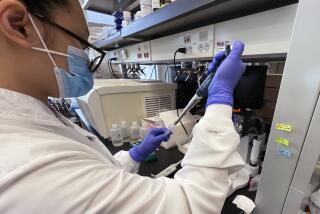Drug-Resistant Infections Going Unidentified
- Share via
Patients in U.S. hospitals are increasingly at risk of becoming infected with bacteria that resist treatment with antibiotics. But a new government survey has found that many hospital and clinic laboratories aren’t routinely performing tests to identify some of the most dangerous drug-resistant strains.
Earlier this month, the federal Centers for Disease Control and Prevention reported the fourth confirmed U.S. case of infection with a strain of Staphylococcus aureus bacteria with partial resistance to vancomycin, an antibiotic that doctors have relied on to treat serious staph infections. Although the strain was promptly identified, the patient--a 63-year-old woman with kidney failure--died despite appropriate treatment with vancomycin and two other antibiotics.
When preliminary laboratory testing suggests that a strain of staph may be vancomycin-resistant, additional tests are needed to confirm resistance. But a CDC survey of 369 laboratories in eight states last year found that 41% of the labs were not performing such confirmatory tests on suspicious strains. And 68% of labs reported that they did not perform tests to identify bacteria with another type of drug resistance known as extended-spectrum beta-lactamases production, or ESBLs. Bacteria with ESBLs produce high levels of enzymes that can break down powerful antibiotics often held in reserve for the sickest patients.
“If you don’t test for this resistance, it means that in the intensive-care units . . . where you have sick patients, the physician will just assume that these antibiotics are going to be effective,” said Fred Tenover, chief of the CDC’s nosocomial pathogens laboratory. If ESBLs resistance exists, “a number of those patients will fail therapy.”
In the CDC survey, labs at hospitals with more than 200 beds were more likely than those at smaller facilities to do both types of tests. On the other hand, laboratories operated by managed-care programs were significantly less likely than others to perform confirmatory tests for vancomycin resistance.
“All laboratories need to have the capacity to detect these problems when they exist,” said Julie Gerberding, director of the CDC’s hospital infections program.
The survey results were published in the Jan. 7 issue of the CDC’s Morbidity and Mortality Weekly Report.






